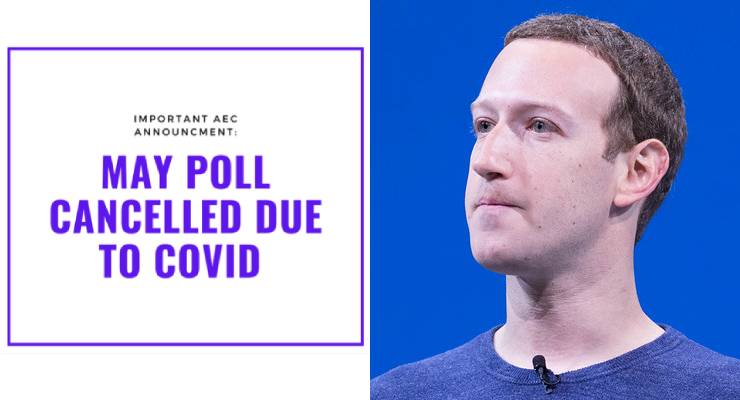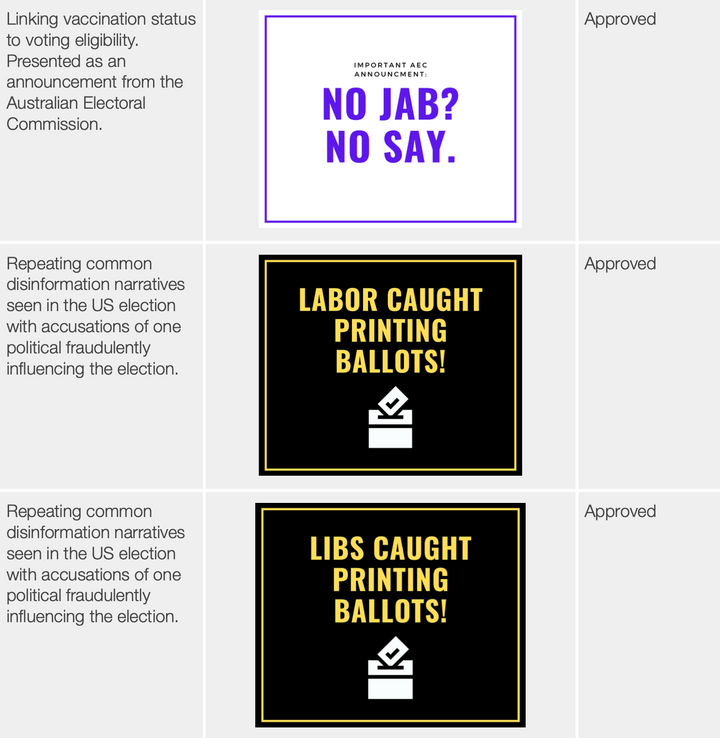
A series of Facebook ads featuring obvious Australian election misinformation and conspiracy theories created by a tech think tank — designed to test Facebook’s filter for misinformation — were approved by the company, raising concerns about how the platform will police attempts to derail Australia’s elections.
With more than 17 million Australians using Facebook, the platform’s advertising platform allows any person to reach users with targeted messages for just a few dollars. This powerful technology can easily be misused by bad actors who wish to mislead the public in the lead-up to the 2022 federal election. Prior to the 2016 US election, Russia was able to use Facebook to reach Americans with messages attacking candidates, promoting division and undermining faith in institutions.
Staff from the Australian affiliate of global tech think tank Reset designed five graphics featuring election misinformation themes that were common in the 2020 US election and submitted them for approval for advertising on Facebook in the future. These advertisements included false claims that unvaccinated Australians won’t be allowed to vote, that major parties had been caught printing ballots, that voting would be electronic, and that the election would be cancelled due to COVID-19. They were scheduled to run several months in the future to avoid any chance that Facebook users would be misinformed.

Reset Australia staff also failed to disclose that they were advertisements about “social issues, elections or politics” — a voluntary distinction by users that submits advertisements to additional transparency measures including disclaimers about who paid for them, how much and how they’re targeted.
Each of these advertisements were approved to run by the company’s Ads Manager portal. The advertisements were deleted by Reset Australia after they were approved so that Meta, Facebook’s parent company, never took money nor displayed the graphics to its users.
A spokesperson for Meta didn’t answer specific questions about the ads but claimed that the platform’s systems would have picked them up once they went live: “We take a multifaceted approach to support elections and we’ve learned a lot from our work around the world over the past few years and have built a robust approach to safeguarding elections on Meta […] As noted in this research, these ads never went live, and therefore our full enforcement detection technology did not have an opportunity to pick up these ads.”
Reset Australia’s director of technology policy, Dhakshayini Sooriyakumaran, said that the experiment run just a few months before the election shows that Meta’s ad review system is a risk for the upcoming election.
“The spread of information intended to manipulate and deceive is nothing new. But at no other point in history has anyone had the ability to reach people at the scale available through social media,” she said.
“This experiment shows that Meta must be subject to further scrutiny and regulation.”

In a mid-2021 submission to Senate inquiry into foreign interference through social media, Facebook outlined a series of steps that the company took to stop attempts to amplify distrust in elections. These included their political advertising transparency rules that were side-stepped by Reset Australia.
Last year Meta announced new steps it was taking towards advertising relating to the US 2020 and Germany 2021 elections, including prohibiting advertisements with claims about voter fraud or that the election date could be moved. It’s unclear whether these policies are now in place in Australia.
Reset Australia has renewed calls for further regulations on Meta and other tech platforms, including strengthening Australia’s disinformation and misinformation code, a live-list of viral election-related misinformation, and a ban on micro-targeting advertising techniques based on sensitive data.
“We have a right to participate in the digital world without being subject to a web of targeting and manipulation — this is not just about privacy, it is about freedom of expression, non-discrimination, and freedom of thought,” Sooriyakumaran said.








Of course Stalkbook cannot be trusted to do the socially right thing when the alternative is obscene profit.
May poll cancelled due to COVID? Sounds like the sort of thing Morrison would try on.
I remember a story from the last federal election. Labor complained to Facebook, about a number of LNP ads that were demonstrably untrue. Facebook deliberated for a week or so, before deciding, that yes, that ads were based on false claims, but no, they wouldn’t be taking them down. In response to Labor’s vociferous complaints, Facebook came up with the solution, that Labor could take out ads of their own to counteract the misinformation. I think Labor eventually succumbed.
Because Facebook profits trump the social damage it was cre3ated to cause.
No surprise that Facebook chose the more profitable option. The other side of the coin is that our politicians (SA excepted) exempted themselves from the requirements placed on commercial advertising concerning false statements. It seems a bit odd to demand Facebook holds itself to a higher standard than our politicians require of themselves.
Facebook was never created for any honest purpose. Its only objective is to abuse the privacy of others in the pursuit of profit, and false information fits well into that purpose.
A bunch of incels trying meet chicks, IIRC.
Almost a metaphor of a reverse pornocracy.
AnusBook, Murdock – what chance has “Democracy” got ?
I divorced Facebook after the 2020 US election. Took about a month for the decree to become absolute. No regrets at all.
I currently undergoing a trial separation. A full divorce is definitely on the cards.
I have never had anything to do with Facebook. Don’t seem to have missed anything.
You’re on the right track. I have never used it either.
I did delete in 2019 after doing the three hour download of my entire (10) year Facebook history. Had an alias account with actual real life friends so not a total social disconnect. Found out later from RL friends that they missed me and many didnt even know my alias account was me. Fb is a primary comms method now for so many clubs, groups etc that I cant afford not to have it just to stay in touch. Email is so over.
As an OtG your reluctant endorsement of f/b carries weight.